Steve Addison's Blog, page 33
November 15, 2020
The Great Commission/s in the Gospels and Acts

The Gospels and Acts record at least four accounts of Jesus’ Commission to his disciples. Each writer gives his uniquely inspired view, each adds something to the complete picture.
The context for each of the Commissions is the death and resurrection of Jesus. Over 40 days Jesus appeared to the eleven apostles and a wider group of disciples, both men and women. He gave convincing proof that he had risen from the dead. Jesus took them through the Scriptures, the Law of Moses, the Prophets and the Psalms opening their minds to understand how they taught that the Messiah must suffer and rise again and how his disciples must continue his mission in the power of the Spirit.
It’s important to realise that without the resurrection, there would have been no missionary movement. The movement did not emerge from the disciples, it was Je- sus who brought them back together and restored them, gave them his authority and gave them their mission with the promise of his abiding presence through the Holy Spirit.
From beginning to end, this missionary movement is a work of God—his authority, his commission and his promise will ensure its success.
1. The AuthorityThe crucified One has risen from the dead and the Father has been given unrivaled and universal authority in heaven and on earth. He brought the kingdom and he is the King. Now as the Father sent him, he sends his disciples.
What will they to do?
2. The CommissionThe disciples are to bear witnesses to the significance of his life, death and resurrection. His message was the kingdom of God is here, repent and believe the good news! They will preach the same message, the kingdom has come, the King has won the victory, repent and believe the good news! They are to preach repentance for the forgiveness of sins. They will make disciples by baptising those who repent and believe, and teaching them to obey everything Jesus has commanded.
Jesus did not say, teach them everything except the command to make disciples of the nations. This mission is for the disciples standing before Jesus, and for every disciple down through the ages until the task is completed.
They will begin in Jerusalem they will go to all nations—to every people group—and not stop going until they reach the uttermost limits of the earth. The fruit of their mission are disciples who have repented and believed and been baptised in community learning to obey what Jesus commanded.
Despite three years with Jesus these disciples have already displayed the limits of their understanding and resolve. What confidence can they have of ultimate success?
3. The PromiseThe risen Lord promises to be with them, and he will be with those who follow them—to the ends of the earth and the end of the age. He will send the gift the Father has promised, the Holy Spirit. They will be baptised—immersed, plunged, overwhelmed—when the Holy Spirit comes on them. The Spirit will clothe them with power from on high, so they can be his witnesses to the world.
His presence, his teaching, his example, that’s all he promises.
The crucified and risen Lord Jesus Christ will continue his mission through his disciples. The rest of the New Testament reveals that as his dynamic Word goes out in the power of the Spirit, the fruit is always repentant and forgiven disciples, in community, learning to obey his commands.
Jesus promised, “This gospel of the kingdom will be preached in the whole world as a testimony to all nations, and then the end will come” (Matt 24:14).
Come, Lord Jesus!
November 12, 2020
235-A Movement of God in Cuba
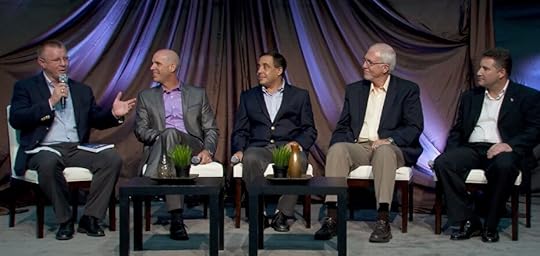
Kurt Urbanek has been a witness and participant in multiplying movements of disciples and churches in Cuba since the mid-1990s. He shares the story and the lessons.
Kurt is the author of Cuba’s Great Awakening: A Church Planting Movement.
November 9, 2020
The Great Commission in Acts

“It is not for you to know the times or dates the Father has set by his own au- thority. But you will receive power when the Holy Spirit comes on you; and you will be my witnesses in Jerusalem, and in all Judea and Samaria, and to the ends of the earth.” Acts 1:7-8
Luke wrote Acts as the second part of his account of the life, death, and resurrection of Jesus and of the birth and growth of the Christian movement. His Gospel describes what Jesus began to do and teach, Acts describes what the risen Lord continues to do through his followers in the power of the Holy Spirit (Ac 1:1). As the word of God goes out, disciples are made and churches are planted in cities and regions throughout Israel and the nations.
After the resurrection, Jesus taught his disciples over 40 days from the Scriptures explaining why it was that the Messiah must suffer and rise again and then the message of repentance for the forgiveness of sins in his name must go to the nations, beginning at Jerusalem. Before they begin the disciples must wait in Jerusalem where they will be clothed with power from on high (Lk 24:45-49).
It was the disciples’ last meeting with Jesus before he ascended to the Father. They ate a meal together and are now on the Mount of Olives overlooking Jerusalem (Ac 1:4, 12). Jesus tells them again to wait in Jerusalem to be baptized (immersed, plunged, overwhelmed) in the Holy Spirit. It is the Spirit who will empower them to be his witnesses throughout the world.
Jesus’ focus is on their mission—the gospel to the ends of the earth—and the promise of the power of the Spirit to enable them. The disciples have questions about the coming of the Kingdom in its fulness. They want to know when that will be.
From the start, Jesus’ message was the kingdom of God. God’s kingly power is present to bring salvation. The kingdom is here because Jesus is the king. Jesus brings forgiveness of sins, healing of the sick, freedom for those oppressed by Satan, the restoration of God’s people, the outpouring of the Holy Spirit. The last days have begun, but it’s not the end, before the kingdom comes in its fullness there’s still a task to complete. They don’t need to know dates and times of his return, that’s the Father’s business. This is what Jesus disciples need to focus on, before the final consummation of the kingdom they will be his witnesses in Jerusalem, and in all Judea and Samaria, and to the ends of the earth.
These were his last words to them as he returns to the Father. Then two angels appeared and told the disciples to stop standing around looking up into the sky, wondering when Jesus will return. There’s a job to be done. The gospel must be preached to all nations before the end can come (Mk 13:10).
The Apostles receive the commission on behalf of all of God’s people, they don’t own or control it. These Galileans can’t fulfill the mission by themselves, they must train and enlist others as they go.1 Others pioneer the work in Samaria and Antioch. Major breakthroughs come from the intervention of the Holy Spirit, rather than careful planning. When Paul and Barnabas launch out on a mission to the “ends of the earth” (Ac 13:47) they are claiming Christ’s commission as their own.
At the heart of the mission is the proclamation of the coming of the King and the offer of salvation through his death and resurrection. Acts tells that story. The word goes out in the power of the Spirit breaking through geographic, language, social, and religious barriers, and the fruit is always disciples and churches. The risen Lord, seated at the right hand of the Father, continues his work on earth until he returns in glory.
Throughout the book of Acts the word keeps advancing despite fierce opposition. At the end of Acts we find Paul under house arrest, chained to a Roman guard, awaiting trial before Nero, but the word is still advancing.
“For two whole years Paul stayed there in his own rented house and wel- comed all who came to see him. He proclaimed the kingdom of God and taught about the Lord Jesus Christ—with all boldness and without hin- drance!” Acts 28:30-31
Rome is not the ends of the earth, it’s the center of the empire. Paul is bound, but the gospel still goes out. Luke doesn’t report the outcome of Paul’s trial, because Acts is not about Paul, it’s about God’s mission—Father, Son, and Holy Spirit—and the part we all play in that story. Acts ends, but the story goes on until the day when the King returns in glory.
The Great Commission in Matthew
The Great Commission in John
The Great Commission in Luke
November 1, 2020
The Great Commission in Luke
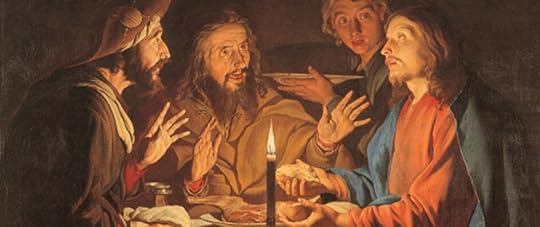
Cleopas and an unnamed disciple recognise Jesus.
It was the Sunday evening following the crucifixion. The disciples were meeting behind closed doors. Early that morning some of the women had discovered the empty tomb and Jesus had appeared to them, and to Simon. As the disciples tried to make sense of these reports, Cleopas and another disciple arrived with news. It was true, Jesus has risen! They had met him on the road to Emmaus.
Suddenly Jesus stood among them and announced, “Peace be with you.” The normal Jewish greeting was now filled with the promise of forgiveness for their desertion and denial. Jesus had come to restore the community of disciples, to show them his resurrection was real, to help them understand that the Messiah had to suffer and rise again, and to prepare them to take the good news to the world.
The disciples were afraid and could not believe what was happening. Jesus assured them he wasn’t a ghost. He showed them the wounds in his hands and feet. They touched him. He took a piece of broiled fish and ate. His body was real. The foundation of their faith will rest on that reality. Without the resurrection, he died a martyr, not a Saviour. Now they understood his death in the light of his resurrection.
He opened their minds to understand the Scriptures—the Law of Moses, the Prophets and the Psalms—every major division of the Hebrew Bible. The whole story of God’s mission was building to the coming of Jesus, his death and resurrection, and the proclamation of the gospel to the nations. Once the disciples understood these things, they were ready for their mission.
Their message was not new. Repentance for the forgiveness of sins was John’s message, and it was Jesus’ message. John the Baptist, Jesus and the disciples all share in the one mission of God which is now expanding to include the whole world. The mission of Jesus’ disciples will show us what the kingdom of God looks like now that Christ has come, died, risen and ascended to the right hand of the Father.
This is the fulfilment of God’s plan after sin came into the world. The descendant of the woman has crushed the Serpent’s head (Gen 3:15). From Jerusalem, the word of the Lord will go out to all nations (Isa 2:3; Mic 4:2) fulfilling the promise to Abraham that through him all nations would be blessed (Gen 12:1-3); and fulfilling the prophecy that the Servant of the Lord will be a light for the Gentiles and through him salvation will reach the ends of the earth (Is. 49:6).
There’s just one more thing. . .
The same Holy Spirit who came upon Jesus at his baptism will now fill his disciples with power to be his witnesses. Jesus doesn’t mention the Spirit by name. He is the “power from on high,” he is “what the Father has promised.” Mystery and anticipation surrounds this power and this promise. The disciples know that he is coming and when he comes, he will be full of surprises.
Series
The Great Commission in Matthew
The Great Commission in John
Sources
October 28, 2020
234-Telling the Story of Movements
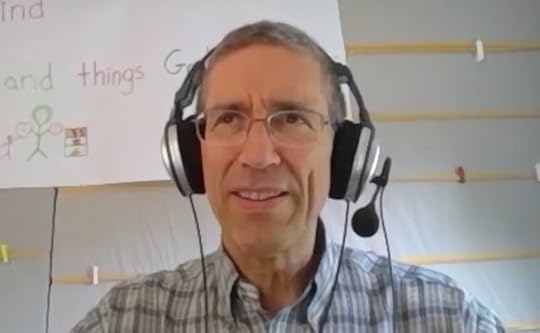
Dave Coles researches and writes about movements. He shares his story and what he's learning from movements that multiply disciples and churches.
He's the author of two books on movements and you can find him at BridgingtheDivide.
My interview with Victor John: 140-Pioneering Movements in North India
October 25, 2020
The Great Commission in John
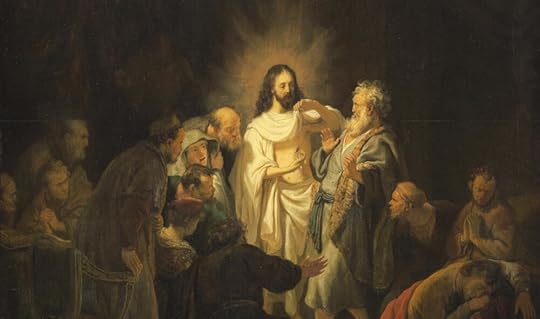
On the evening of that first day of the week, when the disciples were together, with the doors locked for fear of the Jewish leaders, Jesus came and stood among them and said, “Peace be with you!” After he said this, he showed them his hands and side. The disciples were overjoyed when they saw the Lord.
Again Jesus said, “Peace be with you! As the Father has sent me, I am sending you.” And with that he breathed on them and said, “Receive the Holy Spirit. If you forgive anyone’s sins, their sins are forgiven; if you do not forgive them, they are not forgiven.” John 20: 19-23
It’s the Sunday following Good Friday and Jesus’ disciples are meeting behind locked doors. The doors are bolted because they are still afraid that the same Jewish authorities who came for Jesus will come for them. Ten of the Twelve are present along with other disciples (Lk 24:36) when Jesus stood among them and said, “Peace be with you!”
Peace is the common Jewish greeting but it means so much more than “hello”. Shalom refers to the peace that only God brings—the peace of salvation, the peace of restored relationships. In Jesus’ hour of need they deserted him, now Jesus brings them peace, forgiveness and a new beginning.
He showed them the wounds on his hands and in his side, he is no ghost. The crucified Jesus is the risen Lord. Their fear turned to joy.
Jesus will return to the Father, his mission accomplished. He has come to Jesus commission his disciples as he was commissioned by the Father: “As the Father has sent me, I am sending you.” This is a reminder of his earlier prayer for them, “As you sent me into the world, I have sent them into the world” (17:18). Their mission begins, or better still, his mission continues through them.
Jesus was sent into the world by the Father to do his will (6:38-39; 8:29), to speak his words, to perform his works (4:34; 5:36; 9:4) and win salvation for all who believe (3:16-17). At the heart of Jesus’ mission was his obedience and dependence on the Father, who set him apart and poured out the Holy Spirit upon him (1:32; 3:34; 4:34; 5:19; 6:27; 10:36; 17:4). Through Jesus, his disciples have become the children of God, the Spirit has been promised to them, they have been made holy by God’s word as they grow in obedience and dependence on their Lord (1:12–13; 3:3, 5; 14-16; 17:17; 20:17).
By remaining in his love, disciples are to become obedient to the Son as the Son is obedient to the Father. Loving obedience is the fruit of salvation. The Father sent the Son so that all who believe in him might have eternal life and be set free from slavery to sin (1:12-13; 3:16; 8:34-36.) As in Matthew, their mission it is to teach others to obey all that Jesus has commanded (Matt 28:20).
When he was with them, Jesus urged his disciples to lift up their eyes and see the fields are ripe for harvest (4:35-38). He told them that those who believed in him would one day do even greater works than he had done (14:12). He chose them and appointed them to bear fruit that would last (15:16).
The disciples do not replace Jesus or take over his mission. Seated at the right hand of the Father, Jesus now continues his mission through his disciples in the power of the Holy Spirit (14:12-14).
Having commissioned them, Jesus breathed on them and said, “Receive the Holy Spirit.” This reminds us of when God formed the man from the dust of the earth and breathed life into him, and he became a living being made in the image of God (Gen 2:7). It also recalls Ezekiel’s vision of the people of God as a valley of dry bones, without hope until the Lord breathed on them, and they came to life as a vast army (Ez 37:5-14). Jesus is the one who gives the Spirit without limit (3:34).
In John 14-17, Jesus promised that when he ascended to the Father, he would send the Holy Spirit who will never leave them. Jesus promised to come to them in the person of the Holy Spirit and lead them into all truth. The Spirit is not given to the world but given to Jesus’ disciples that they may bear witness to him.
Their mission in the power of the Spirit is the offer to the world of the forgiveness of sins in Jesus’ name. The authority to forgive sins or withhold forgiveness doesn’t reside in Jesus’ disciples. They have the power to proclaim forgiveness. As the disciples share the good news about Jesus, God will forgive the sins of those who believe. Everyone who looks to the Son and believes in him will have eternal life (6:40). Whoever rejects the offer of forgiveness will remain under God’s judgment (9:39.)
In all the accounts of Jesus’ commission to his disciples, the same themes recur — the crucified Jesus is the risen conquering Lord whose mission continues through his disciples in the power of the Holy Spirit. They are to take the good news about Jesus to the world proclaiming the forgiveness of sin in his name. As people turn to him in faith they are united with him and welcomed into the same relationship of love and surrender that Jesus has with the Father.
The Great Commission in Matthew
Sources
October 23, 2020
The Great Commission Table
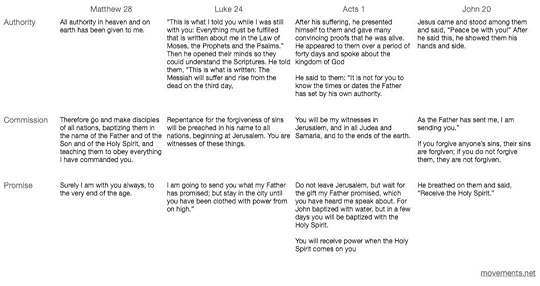
I’m doing a series on the Great Commission in the Gospels and Acts. Each writer gives his uniquely inspired view, each adds something to the complete picture. We began in Matthew.
Above is an overview so you can compare the different accounts. You can also download the original file. A great team exercise would be to take each version and identity the key elements under these headings:
The Authority
The Commission
The Promise
I’ll come back to this at the end of the series.
*I’m not including Mark 16:19-20 as it’s probably a later addition to Mark’s Gospel.
October 18, 2020
The Great Commission in Matthew
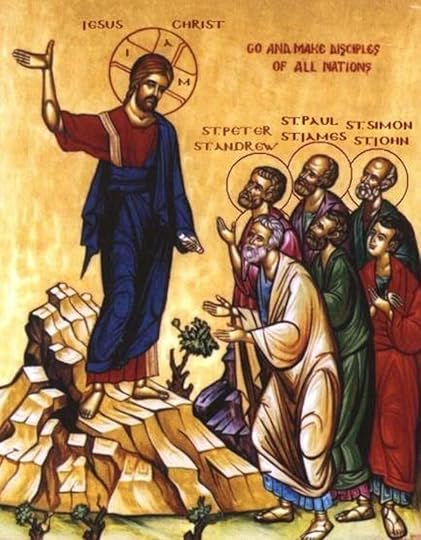
For most of the last six months, our city has been in serious lockdown. Overnight the year I had planned disappeared. For much of that time I’ve been on a journey from Genesis to Revelation trying to understand God’s mission and our role in it. The result has been the draft of my next book.
During those months I’ve been neglecting this blog, now it’s time to reengage and share what I’m learning about our part in God’s plan. A great place to start is with the Great Commission.
Then Jesus came to them and said, “All authority in heaven and on earth has been given to me. Therefore go and make disciples of all nations, baptizing them in the name of the Father and of the Son and of the Holy Spirit, and teaching them to obey everything I have commanded you. And surely I am with you always, to the very end of the age” (Matthew 28:18-20).
From Genesis to Revelation, the Bible is full of stories, but uniting them all is one storyline — God’s mission to reveal his glory by redeeming humanity and by bringing in a new heaven and a new earth. God’s mission is what he does, but we have a part to play. That’s what the Great Commission is all about, our part in his story.
God’s mission is greater than our contribution. We will never atone for the sins of the world; Christ did that once and for all. God alone will create the new heavens and a new earth. God alone will judge the world and punish evil. What is the part we play in God’s story? We bear witness to God’s mission in Christ. At the beginning of his Gospel, Matthew tells us why Jesus came, it is to “save his people from their sins” (Matt 1:21). He will do that by giving his life as “a ransom for many” (Matt 20:28). At their last meal together Jesus gave thanks for the cup and shared it with his disciples declaring, “This is my blood of the covenant, which is poured out for many for the forgiveness of sins (Matt 26:27).
As Jesus hung on the cross the land was plunged in darkness for three hours. Darkness is a sign of God’s judgment on sin. Out of the darkness Jesus cried, “Eli, Eli, lema sabachthani?” which means “My God, my God, why have you forsaken me?” (Matt 27:46). Jesus didn’t just feel forsaken, he was forsaken. He took upon himself all the guilt and shame of humanity’s rebellion and received God’s righteous judgment in our place. This is his greatest moment, the glory of God revealed in loving sacrifice for our sakes.
When Jesus declared, “All authority in heaven and on earth has been given to me,” it was with the cross in mind. The one who rules is the one who suffered and died and rose again. He is worthy.
“Therefore,” because of what Jesus has done, we are to make disciples of the nations. The whole Gospel of Matthew shows us how Jesus went about making disciples. The disciples are to do for others, what Jesus has already done for them. It’s not easy, but it’s not complicated.
The new element is that this mission will not be confined to Israel. The whole world is now their mission field. The core command is to make disciples of the nations, but that can’t happen unless they “go.” Go means a change of location. The good news of Jesus must cross, social, geographic, language, cultural and religious boundaries; it must be made known to every people group throughout the whole world. It’s as simple as that, but not easy.
The other thing they must do is immerse or baptize — they mean the same thing — new disciples into a relationship with the Father, Son, and Holy Spirit. Immersion takes place when a disciple has repented and believed the good news about Jesus.
Our part in God’s mission is to make disciples of the nations. We do that by going, proclaiming the gospel, baptizing and teaching them to obey everything Jesus has commanded — again, clear but demanding.
Discipleship begins with God’s grace in Christ and always leads to a life of learning to follow him in obedience. Learning to obey is never done alone, always with others. Here are a few of Jesus’ commands: repent and believe, be baptized, love one another, give generously, honor marriage, forgive, celebrate Lord’s supper, fear God, remain in him, make disciples of the nations. Obedience does not earn salvation, but it is always the fruit of salvation. True disciples learn to obey Christ in community.
Note, Jesus did not say, teach them to obey everything I have commanded, except that one command to make disciples. Like the command to love your enemies, the command to make disciples is for every disciple. Disciples make disciples. Maturity in discipleship is evidenced by following the Lord Jesus and learning from him how to fish for people (Matt 4:19).
The Great Commission is so clear and concrete; it’s baffling that we find it so hard to do. Perhaps that’s because we don’t read Jesus’ words to the very end.
The Great Commission begins with Jesus’ universal authority, it ends with the promise of his powerful presence to the end of the age, and to the ends of the earth. As we obey his mandate, we have his authority and we have his presence, wherever we go. There are no other resources promised, just the authority and presence of the living Lord Jesus given to every disciple who obeys the Great Commission.
What is God up to?

For most of the last six months, our city has been in serious lockdown. Overnight the year I had planned disappeared. For much of that time I’ve been on a journey from Genesis to Revelation trying to understand God’s mission and our role in it. The result has been the draft of my next book.
During those months I’ve been neglecting this blog, now it’s time to reengage and share what I’m learning about our part in God’s plan. A great place to start is with the Great Commission.
Then Jesus came to them and said, “All authority in heaven and on earth has been given to me. Therefore go and make disciples of all nations, baptizing them in the name of the Father and of the Son and of the Holy Spirit, and teaching them to obey everything I have commanded you. And surely I am with you always, to the very end of the age” (Matthew 28:18-20).
From Genesis to Revelation, the Bible is full of stories, but uniting them all is one storyline — God’s mission to reveal his glory by redeeming humanity and by bringing in a new heaven and a new earth. God’s mission is what he does, but we have a part to play. That’s what the Great Commission is all about, our part in his story.
God’s mission is greater than our contribution. We will never atone for the sins of the world; Christ did that once and for all. God alone will create the new heavens and a new earth. God alone will judge the world and punish evil. What is the part we play in God’s story? We bear witness to God’s mission in Christ. At the beginning of his Gospel, Matthew tells us why Jesus came, it is to “save his people from their sins” (Matt 1:21). He will do that by giving his life as “a ransom for many” (Matt 20:28). At their last meal together Jesus gave thanks for the cup and shared it with his disciples declaring, “This is my blood of the covenant, which is poured out for many for the forgiveness of sins (Matt 26:27).
As Jesus hung on the cross the land was plunged in darkness for three hours. Darkness is a sign of God’s judgment on sin. Out of the darkness Jesus cried, “Eli, Eli, lema sabachthani?” which means “My God, my God, why have you forsaken me?” (Matt 27:46). Jesus didn’t just feel forsaken, he was forsaken. He took upon himself all the guilt and shame of humanity’s rebellion and received God’s righteous judgment in our place. This is his greatest moment, the glory of God revealed in loving sacrifice for our sakes.
When Jesus declared, “All authority in heaven and on earth has been given to me,” it was with the cross in mind. The one who rules is the one who suffered and died and rose again. He is worthy.
“Therefore,” because of what Jesus has done, we are to make disciples of the nations. The whole Gospel of Matthew shows us how Jesus went about making disciples. The disciples are to do for others, what Jesus has already done for them. It’s not easy, but it’s not complicated.
The new element is that this mission will not be confined to Israel. The whole world is now their mission field. The core command is to make disciples of the nations, but that can’t happen unless they “go.” Go means a change of location. The good news of Jesus must cross, social, geographic, language, cultural and religious boundaries; it must be made known to every people group throughout the whole world. It’s as simple as that, but not easy.
The other thing they must do is immerse or baptize — they mean the same thing — new disciples into a relationship with the Father, Son, and Holy Spirit. Immersion takes place when a disciple has repented and believed the good news about Jesus.
Our part in God’s mission is to make disciples of the nations. We do that by going, proclaiming the gospel, baptizing and teaching them to obey everything Jesus has commanded — again, clear but demanding.
Discipleship begins with God’s grace in Christ and always leads to a life of learning to follow him in obedience. Learning to obey is never done alone, always with others. Here are a few of Jesus’ commands: repent and believe, be baptized, love one another, give generously, honor marriage, forgive, celebrate Lord’s supper, fear God, remain in him, make disciples of the nations. Obedience does not earn salvation, but it is always the fruit of salvation. True disciples learn to obey Christ in community.
Note, Jesus did not say, teach them to obey everything I have commanded, except that one command to make disciples. Like the command to love your enemies, the command to make disciples is for every disciple. Disciples make disciples. Maturity in discipleship is evidenced by following the Lord Jesus and learning from him how to fish for people (Matt 4:19).
The Great Commission is so clear and concrete; it’s baffling that we find it so hard to do. Perhaps that’s because we don’t read Jesus’ words to the very end.
The Great Commission begins with Jesus’ universal authority, it ends with the promise of his powerful presence to the end of the age, and to the ends of the earth. As we obey his mandate, we have his authority and we have his presence, wherever we go. There are no other resources promised, just the authority and presence of the living Lord Jesus given to every disciple who obeys the Great Commission.
October 14, 2020
233-Growing Leaders
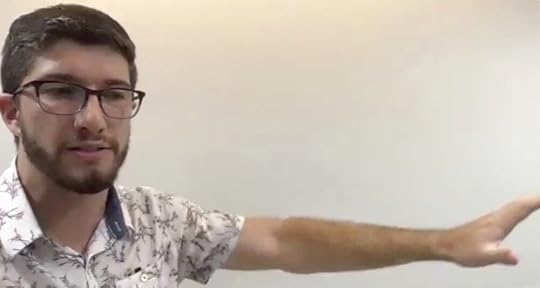
Daniel, Dayne and Than join us to talk about growing leaders who multiply disciples, churches and leaders.
For online training Daniel recommends the e3partners NoPlaceLeft training page.











